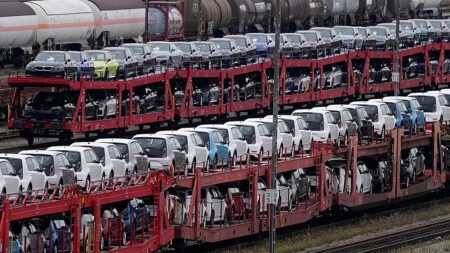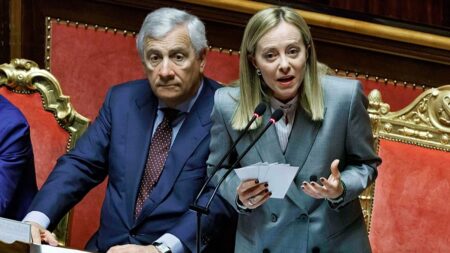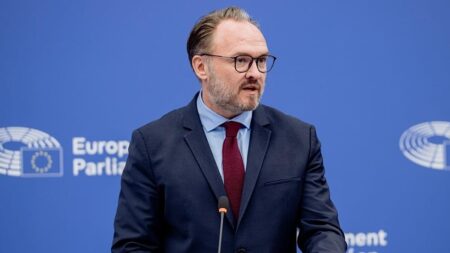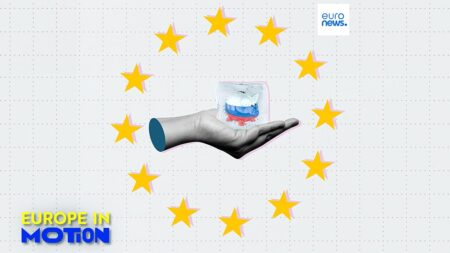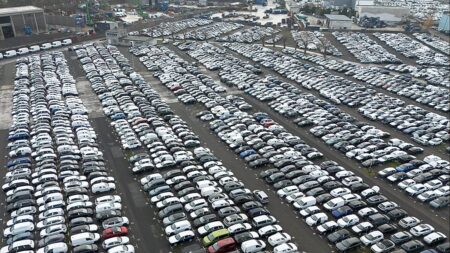The European Commission is working on a new proposal to impose tariffs on the Russian oil that still enters the single market via Hungary and Slovakia amid mounting pressure from Donald Trump to cut off all energy ties with Moscow for good.
The extra duties are meant to increase material costs for both nations and, therefore, stimulate the urgency to find alternative suppliers.
“We will in due course present what we have on mind with this,” Olof Gill, the Commission’s deputy spokesperson, said on Wednesday, noting the initiative will be separate from the 19th package of sanctions currently on the table.
The EU imposed a full ban on Russian crude and refined petroleum products in 2022 as part of its vast sanction regime in response to the full-scale invasion of Ukraine. The ban was hailed as a major step in ending the bloc’s historical dependency on Moscow.
Controversially, Hungary and Slovakia, two landlocked member states, secured an exemption that allowed them to continue purchases through the Druzhba pipeline.
The countries are each estimated to receive 100,000 barrels per day of Urals oil, a heavy type which their refineries have been designed to process.
The carve-out, which was supposed to be temporary, has never been revisited.
But now, Donald Trump has brought it to the fore. The American president has publicly called on European nations to immediately cease purchases of Russian oil as a means to tighten the screws on the Kremlin and end the war in Ukraine.
“China and India are the primary funders of the ongoing war by continuing to purchase Russian oil – but inexcusably, even NATO countries have not cut off much Russian energy,” Trump said in his address to the UN General Assembly.
Ursula von der Leyen, the president of the Commission, told Trump in New York that the bloc is intent on removing “the last bits of oil and gas” coming from Russia.
“President Trump is absolutely right. We’re on it. We have already massively reduced the gas supply from Russia. (We) completely got out of Russian coal and massively also reduced the oil supply, but there’s still some coming to the European continent,” von der Leyen said in reply to a question from a reporter in the room.
“We put sanctions out to those ports where, for example, LNG is coming from Russia. We want to put tariffs on oil supplies that are still coming to the European Union.”
The Commission refused to provide further details on the tariffs.
The upcoming initiative is a novel attempt to accelerate the phase-out of Russian fossil fuels, currently scheduled to be completed by 2027. Until now, the bloc had used tariffs on imports of Russian grain but never on Russian energy.
“We have to be faster because every payment is filling Putin’s war chest. This cannot be,” von der Leyen said regarding the 2027 deadline.
Hungary and Slovakia have vehemently opposed the phase-out,** warning it would endanger energy security, raise prices for consumers and prompt costly lawsuits.
However, Trump’s pressure campaign has put both countries in an increasingly uncomfortable position and forced them to reckon with their enduring dependency.
In a recent interview with The Guardian, Hungarian Foreign Minister Péter Szijjártó said the supply of oil and gas was a “purely physical question” dependent on connections between the landlocked country and energy suppliers.
“We can’t ensure the safe supply [of energy products] for our country without Russian oil or gas sources,” Szijjártó said, noting he “understood” Trump’s approach.
“It can be nice to dream about buying oil and gas from somewhere [besides Russia] … but we can only buy from where we have infrastructure,” he added. “And if you look at the physical infrastructure, it’s obvious that without the Russian supplies, it is impossible to ensure the safe supply of the country.”
Unlike sanctions, which depend on the unanimity of all 27 member states, tariffs require a qualified majority to be approved, meaning individual vetoes will not apply.
Read the full article here







